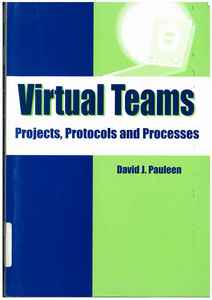Trust, rationality and virtual teams
Murphy, Peter (2004) Trust, rationality and virtual teams. In: Pauleen, David J., (ed.) Virtual Teams: Projects, Protocols and Processes. Idea Group Publishing, Hershey, USA, pp. 316-342.
|
PDF (Published Version)
- Published Version
Restricted to Repository staff only |
||
![[img]](https://researchonline.jcu.edu.au/22584/4.hassmallThumbnailVersion/22584_Murphy_2004_Front_cover.jpg)
|
Image (JPEG) (Front cover)
- Cover Image
Download (118kB) |
Abstract
Virtual teams need trust in order to function. Trust is an efficient way of gaining group cooperation. Online, trust is more effective than instruction or authority or status in getting people who are largely strangers to one another to work together. But trust is not a simple quality. The kind of trust that is the cement of distance relations of a global or virtual kind is different from the type of trust that binds face-to-face interactions and from the procedural kind of trust that operates in regional or national organizations of a traditional managerial kind. This study looks at the ways in which trust between virtual team members is generated. "Trust between strangers" is optimally generated when persons are allowed to self-organize complex orders and create objects and processes of high quality. Also looked at are the kinds of personalities best suited to working in a virtual collaborative environment. The study concludes that persons who prefer strong social or procedural environments will be less effective in a virtual environment. In contrast, self-steering ("stoic") personality types have characteristics that are optimally suited to virtual collaboration.
| Item ID: | 22584 |
|---|---|
| Item Type: | Book Chapter (Research - B1) |
| ISBN: | 978-1-59140-225-1 |
| Date Deposited: | 17 Oct 2012 23:02 |
| FoR Codes: | 08 INFORMATION AND COMPUTING SCIENCES > 0806 Information Systems > 080611 Information Systems Theory @ 50% 16 STUDIES IN HUMAN SOCIETY > 1608 Sociology > 160806 Social Theory @ 50% |
| SEO Codes: | 95 CULTURAL UNDERSTANDING > 9502 Communication > 950299 Communication not elsewhere classified @ 50% 97 EXPANDING KNOWLEDGE > 970108 Expanding Knowledge in the Information and Computing Sciences @ 50% |
| Downloads: |
Total: 189 Last 12 Months: 2 |
| More Statistics |



